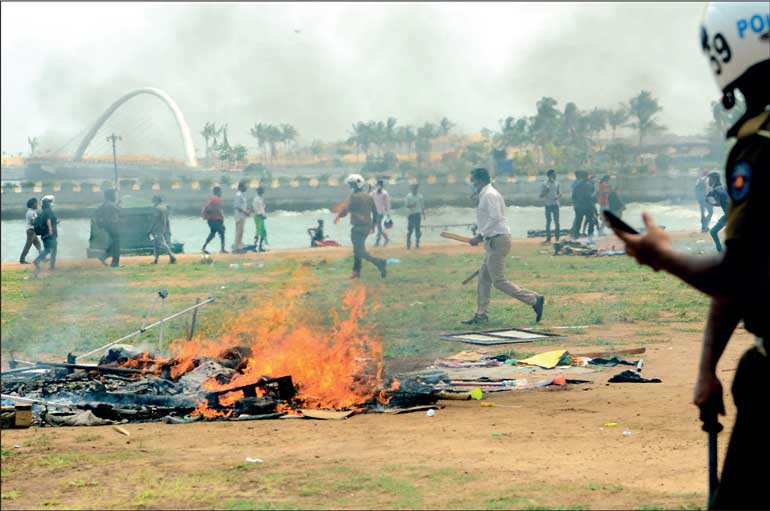Friday Feb 13, 2026
Friday Feb 13, 2026
Wednesday, 11 May 2022 00:09 - - {{hitsCtrl.values.hits}}

Whatever the reason, such mob actions cannot be endorsed because the next step is anarchy - Pic by Shehan Gunasekara
Former Prime Minister Mahinda Rajapaksa set fire to the country before resigning on 9 May.
He gathered an assortment of what turned out to be politician thugs or professional thugs at his official residence and clearly enticed them before letting them loose on protestors outside his residence and in the Galle Face Green a kilometre away. The mob brutally beat up the protestors but soon they were rounded up in the green itself or on their way out by a sympathetic public who, informed over social media of what was happening at Galle Face, spontaneously gathered and responded in a counterattack.
residence and clearly enticed them before letting them loose on protestors outside his residence and in the Galle Face Green a kilometre away. The mob brutally beat up the protestors but soon they were rounded up in the green itself or on their way out by a sympathetic public who, informed over social media of what was happening at Galle Face, spontaneously gathered and responded in a counterattack.
Unfortunately, the counter attacks continued late into the night with burning and vandalising of perpetrators’ property. It was a demonstration of pure rage over representatives who abused the public’s trust to look after themselves. Whatever the reason, such mob actions cannot be endorsed because the next step is anarchy.
One ray of hope in this dark hour is the consensus on the proposals for economic and political recovery by the Bar Association of Sri Lanka (BASL) as indicated by the responses of the President and the Samagi Jana Balawegaya (SJB), the main opposition party. It is a set of well thought out proposals adding to a record of exemplary initiatives by BASL as a professional body.
The proposal by BASL includes a sequence of steps for restoring economic and political stability. They call for the formation of an all-party government, abolishing of the 20th, and reducing the powers of the President and more but missing is a roadmap.
Following is a roadmap collated from ideas that are currently being tossed around by civil society organisations and in social media.
Press on with #GotaGoHome, but work with Gota until then
The backdrop to whatever steps we take is the struggle in the streets demanding the resignation of President Gotabaya Rajapaksa who is responsible for the present economic catastrophe. His departure is an inevitability as he holds onto a shell of a Presidency, but we are yet to see the happy day. An impeachment, the only solution in the hands of the Parliament is a lengthy process. Until then the Parliament has no choice but to proceed as best as it could. Fortunately, the National People’s Power (NPP) Party and SJB who held the hardline that Gota should resign before they engage with an interim government have changed their stance.
What are the options before the Parliament regarding an interim government?
Reach consensus on an interim PM
After Mahinda Rajapaksa’s resignation from the PM post, the urgency is for parliamentarians to put their heads together to select an interim PM and demand his/her appointment from a beleaguered President, before he chooses one. BASL’s recommendation for an interim PM is essentially a consensus builder.
To quote: “The Prime Minister is to be a Member of Parliament who can establish a consensus among all political parties recognised by the Speaker in Parliament on the national economy and to enact necessary reforms. If there is no Member of Parliament who meets this criteria due to the exigencies of the situation a vacancy created by the resignation of a National List MP may be used to facilitate the entry into Parliament of an individual who meets this criteria where there is bi-partisan consensus to appoint a person who is not presently a Member of Parliament as the Prime Minister, even if such individual’s name did not appear in the original List submitted to the National Elections Commission.”
It would be phenomenal if somebody like M.A. Sumanthiran of the Tamil National Alliance can be named as our interim MP. During the past few weeks, Sumanthiran and his party TNA, despite their nametag, have done more in the national interest than our official Opposition Party, the SJB, which has acted in its Party’s interests. Another dark horse is Patali Champika Ranawaka, arguably the best visionary and doer in Parliament. What the process will eventually toss up is anybody’s guess.
Reduce the powers of the Presidency through a 21st Amendment
The first order of business for an interim PM is to set in motion the passage of a 21st Amendment to reduce the powers of the presidency. After the Gota experience, I am sure there is consensus that no such powers shall be ever given to one person no matter who it is.
SJB put forward an ambitious amendment that not only reinstates the 19th Amendment which reduced powers of the President but goes beyond to make the presidency a nominal one. A much less ambitious amendment which was gazetted as the 22nd Amendment put forward by a group of Independent MPs in the Parliament is limited to reinstating the Constitutional Council but with some modifications and re-establishing independent commissions. A consensus would include something in between.
A common minimum program with relief and recovery targets
The next order of business for the PM would be to draft a common minimum program to bring together the Parliament as one and address the immediate problems of relief for people and recovery for the country from the current predicament. The BASL proposals entail a program in sufficient detail to serve as a starting point.
A cabinet of 15 doers committed to the targets
Next task would be to form a cabinet of doers who will pledge to work towards relief and recovery targets putting aside their party affiliations. They should be chosen based on prior performance or potential for performance in each portfolio in the Cabinet.
Interestingly, the number 15 portfolios as an upper limit for such a Cabinet proposed by BASL coincides more or less with the number of existing sectoral oversight committees in Parliament and the portfolios worked out by civil society organisations using information on cabinets across the world and past cabinets in Sri Lanka. My own compilation includes – Finance, External affairs, Defence, and Internal Affairs, Justice, Environment, Industry and Commerce, Agriculture, Education or Human Resources, Health, Family and Community, Culture and Society, and Infrastructure – a set of 13 portfolios and an additional two for allowing the breakup some of the 13 portfolios as needed.
The method of selection of ministers could be based on the chairmanship of parallel sectoral committees in the Parliament covering the same topics. The chairman could be selected by vote or by consensus of all party leaders’ groups. Also, there should be a TOR for each ministry which is not the generic list that is traditionally doled out at swearing-ins of ministers, but includes specific measures focused on relief and recovery.
Parallel executive sectoral committees in Parliament
The BASL puts a heavy emphasis on having a council of 15 experts to advise the Cabinet of Ministers. I have a problem with that concept. First line of advice to ministers should come from the sectoral committee set up for the purpose in Parliament. The committee should choose the expertise they need in their deliberations.
In fact, I propose, and many have concurred, that all members of parliament sans the PM and speaker should belong to one of the 15 sectoral committees and participate in policymaking at committee level. Such deliberations are expected to lead to more consensual decision-making which is not possible in confrontational debates on the floor of the Parliament.
Further, why have one expert per sector when we have a whole set of commissions and councils under each ministry? Rajapaksism has made these institutions mere puppets. The sectoral committees should vet the appointments to these institutions and make sure the committee gets the best expertise the country has to offer.
Agree on an electoral method and a date for elections
Finally, a timetable and a method for the next election needs to be established. With the possibility of unlimited black money put into circulation by the Rajapaksa family, an electoral system needs to be formed to reduce their influence when the country faces the next Parliamentary election.